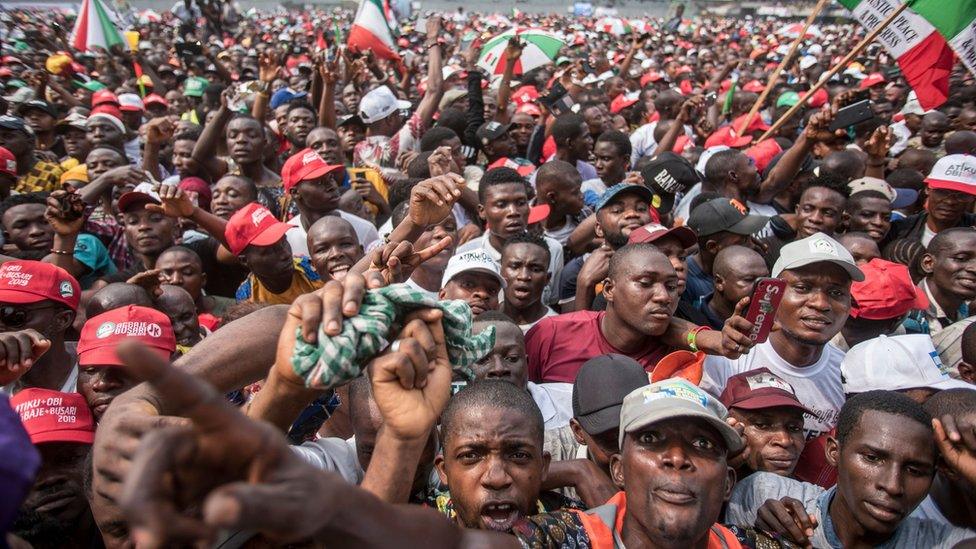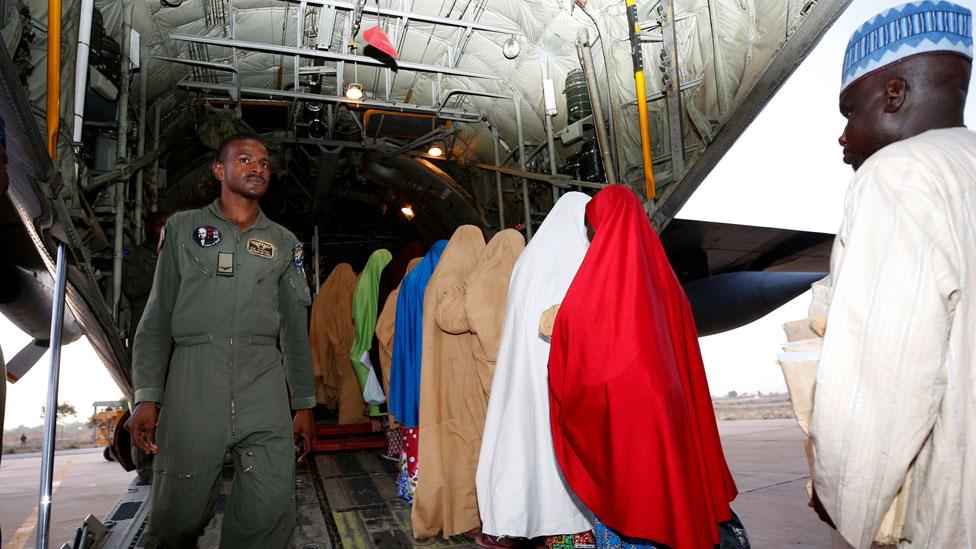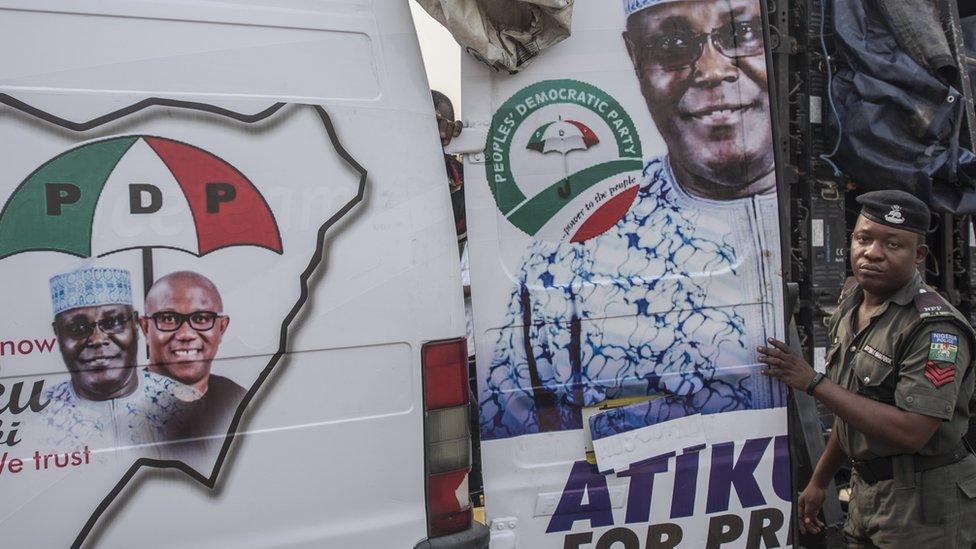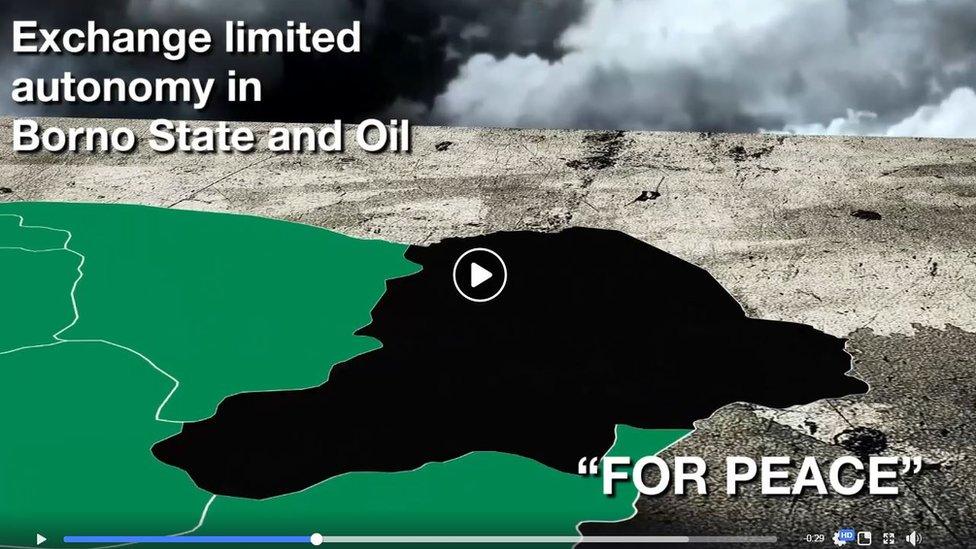Nigerian elections 2019: The spread of false information
- Published

The campaign to elect Nigeria's next president is drawing to a close with accusations flying over the abuse of social media to spread misleading information.
Both of the main political parties have told BBC Reality Check their rivals are involved in the spread of disinformation.
The incumbent president, Muhammadu Buhari, of the All Progressives Congress (APC), and his main rival, Atiku Abubakar, running for the People's Democratic Party (PDP), have both been the target of videos containing dubious or inaccurate information, being shared online.
Accusations flying in both directions
"There has been some efforts by the PDP campaign to push disinformation," says Tolu Ogunlesi, head of digital communications for President Buhari.
Both parties deny any knowledge of people inside the party spreading disinformation.
"The APC is predicated on propaganda - they have manipulated pictures and words," says Paul Ibe, a media adviser to Mr Abubakar.
The APC denies the accusations and attacks the PDP for spreading lies.
"Political parties support and encourage the dissemination of divisive 'fake news' on their behalf but have little control over its development and spread," according to Jonathan Fisher, who is overseeing a project looking at the role of WhatsApp in Nigeria's elections.
Written posts, photos and videos have been shared on social media platforms, publicly on Facebook and in private WhatsApp groups, spreading unsubstantiated rumours about the candidates.
One of the most prominent is that a double is standing in for President Buhari at public events, which he has repeatedly and firmly denied.
Here is a round-up from Reality Check of some of the false rumours and misleading information spread against the two men vying to become Nigeria's next president.

The Dapchi girls were flown to Abuja on a military plane
Missing Dapchi girl
One example of disinformation, which started to appear on social media a few days ago, has been about Leah Sharibu, a 15-year-old held captive for nearly a year by Islamist militants Boko Haram for refusing to convert to Islam.
More than 100 girls were kidnapped from the village of Dapchi, in northern Nigeria, and all but one have now been released.
The messages and posts, spread on WhatsApp and Facebook, claimed that Leah had died - and they quickly went viral.
An anonymous "family source" had confirmed the death of the girl, according to social media posts.
In response, a government minister called the story "absolute fake news", external and Mr Ogunlesi, from Mr Buhari's campaign, says the story was used to deliberately target the government.
Free cash?

The accusation here is that opposition candidate Atiku Abubakar was behind a ploy to hand out cash and food boxes at a political rally.
This story was shared online by Lauretta Onochie, an aide to President Buhari, who posted a photo of boxes wrapped together with Nigerian currency notes in the northern state of Sokoto.
"Keep them in poverty, then give them handouts - Atiku in Sokoto yesterday," she wrote.
The Buhari campaign denies spreading any disinformation.
However, the photo is two years old and was taken at an event organised by the Kokun Foundation, which campaigns against hunger.
A media adviser for the Atiku campaign told BBC Reality Check: "Atiku will not give handouts to anybody."

Make Nigeria worse again?
Another widely shared video accuses Atiku Abubakar of brokering a deal with Boko Haram in exchange for land and oil.
The short video, viewed over 200,000 times, was shared from a Facebook page called "Make Nigeria Worse Again". But it has no details about where or when the Atiku campaign was supposed to have announced the plan.
The Atiku campaign team told BBC Reality Check that the deal did not exist - "there is nothing to that affect".

More about Nigeria's elections:

When Buhari voted 'against Nigeria'
And finally, we've turned up an inaccurate story doing the rounds online portraying Muhammadu Buhari as both unpatriotic and bestowing favours on a member of his own ethnic group when he was military head of state in the 1980s.
This would be potentially damaging to Mr Buhari's attempt to appeal to all Nigerians, not just those from his own region.
The story relates to Mr Buhari's failure to support the election of a Nigerian candidate for the post of secretary general of the Organisation of African Unity, the precursor of the African Union (AU).
Instead, the story goes, he supported a non-Nigerian from the neighbouring country of Niger - where a member of his own Fulani ethnic group was a candidate for the job.
This story has been repeatedly and emphatically rejected by the president's spokesman, Garba Shehu.

